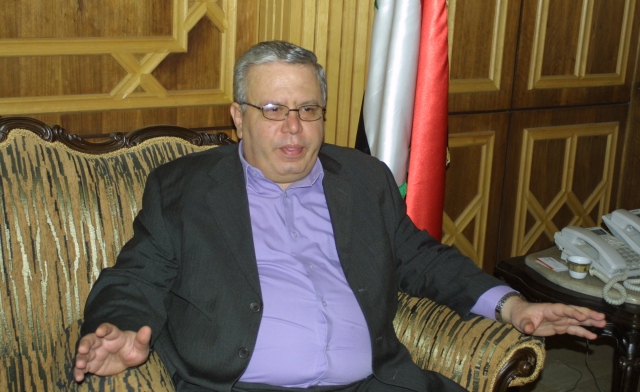Exclusive: GlobalPost speaks with Syria’s minister of justice

By Reese Erlich
November 18, 2013
As the government retakes significant positions from the rebels, President Bashar al-Assad’s confidant Najm al-Ahmad discusses the war.
DAMASCUS, Syria — Within the last few days the Syrian Army has retaken areas on the outskirts of Damascus, as well as parts of Homs and Aleppo, according to Najm al-Ahmad, Syria’s minister of justice and trusted confidant of President Bashar al-Assad.
He said the country’s major cities are nearly all back in the government camp after more than a year of being under rebel control, the latest power shift in a seesawing, two-and-a-half-year war that has taken a heavy toll on civilians, killing more than 40,000 and displacing an estimated 6.8 million people.
“In the city of Damascus there are no problems,” Ahmad told GlobalPost in an exclusive interview. “The road from Damascus to Homs is safe.”
But Ahmad admitted that Damascus is under regular attack by rebels. During the Saturday interview, for example, artillery fire could be heard as the Syrian Army continued to shell rebel held areas on the southern outskirts of Damascus. That same day, the Syrian Army closed the Damascus-Homs highway due to fighting in the Qalamoun area. It’s expected to be blocked for at least the rest of the week.
Then on Sunday, a rebel bomb killed 31 government troops at an army vehicle depot on the northern outskirts of Damascus. Rebels dug a 50-foot-deep tunnel under the building and then set off explosives, according to military sources at the scene. City residents feel the impact of the war as military checkpoints slow traffic to a crawl, soldiers guard major intersections and residents face shortages of gasoline and electricity.
Rebel groups fighting the Syrian government concede that they have faced some setbacks but deny that the government controls major cities such as Homs and Aleppo, where rebel leader Abdelqader Saleh, head of the Islamist al-Tawhid Brigades, was killed Monday. The rebels argue that their losses are temporary.
The government appears to have made headway in the battle for the Damascus suburbs, long controlled by a patchwork of rebel factions, recapturing five towns since mid-October.
Khaled Mahjoub, a Syrian-American businessman in Damascus, confirmed that the town of Sbeneh was recaptured by the army last week. He owns a factory there that was looted by rebels. The area had been controlled by rebels associated with Jabhat al-Nusra, an extremist faction seeking to impose a clerical dictatorship on Syria.
Like many well-to-do businessmen, Mahjoub supports the government as a bastion against extremist rebels. “Assad is the best change agent for the time being,” he said.
The battle for the southern outskirts of Damascus remains fraught. Rebels regularly launch rocket and mortar fire into Damascus from areas they control. Sometimes the fire hits military and government targets.
On other occasions rebel groups appear to target civilian neighborhoods supportive of the government.
On Nov. 11, mortar rounds killed four Armenian Christian children waiting for a school bus, along with their driver. On the same day, nine Greek Orthodox children were killed and 27 injured in a separate mortar attack. Many Christians believe that rebels single out their neighborhoods for attack.
Human rights groups say the Syrian Army also indiscriminately shells civilian areas. An April report by Human Rights Watch detailed numerous cases of aerial and artillery bombardment of civilians.
Justice Minister Ahmad hotly denies the charges.
“If the army was randomly using heavy artillery,” he argued, “maybe it would end the crisis in months. But the army desires to preserve civilian lives and that lengthens the time of this crisis.”
Ahmad maintains that his government’s recent military victories combined with disarray amongst rebel groups have caused major problems for US policy towards Syria.
In August sarin gas killed civilians in a rebel-held area near Damascus. The Obama administration maintained that the Syrian military killed over 1,400 people in the attack, announcing plans to bomb Syria.
But, in the Syrian government’s view, global and US domestic popular opinion forced Obama to back down. The US, Russia and Syria then agreed on a plan to dismantle Syria’s chemical weapons. Later the US opened talks with Iran on the nuclear issue.
All these events have taken pressure off Syria internationally. The US is now looking for an exit strategy from the Syrian war, according to Ahmad.
“The US stand fluctuates and is not fixed,” he said.
The US is also stymied by the intransigence of groups such as al-Nusra, according to Bassam Abu Abdullah, head of the Damascus Center for Strategic Studies, a pro-government think tank.
“The US can’t halt the growth of al-Qaeda affiliated groups in Syria,” he said. “And nobody can control them. The US is looking for an exit strategy but can’t find one.”
Ahmad said Syria remains ready to attend Geneva peace talks without preconditions. But he doesn’t put much stock in the chance of success given what he characterized as rebel reluctance to participate.
“If the opposition goes to Geneva, that’s good,” said Ahmad. “That’s better. Whether they go or not, we will not stop fighting.”
———–
Reese Erlich received a travel grant from the Pulitzer Center on Crisis Reporting for reporting in Syria.